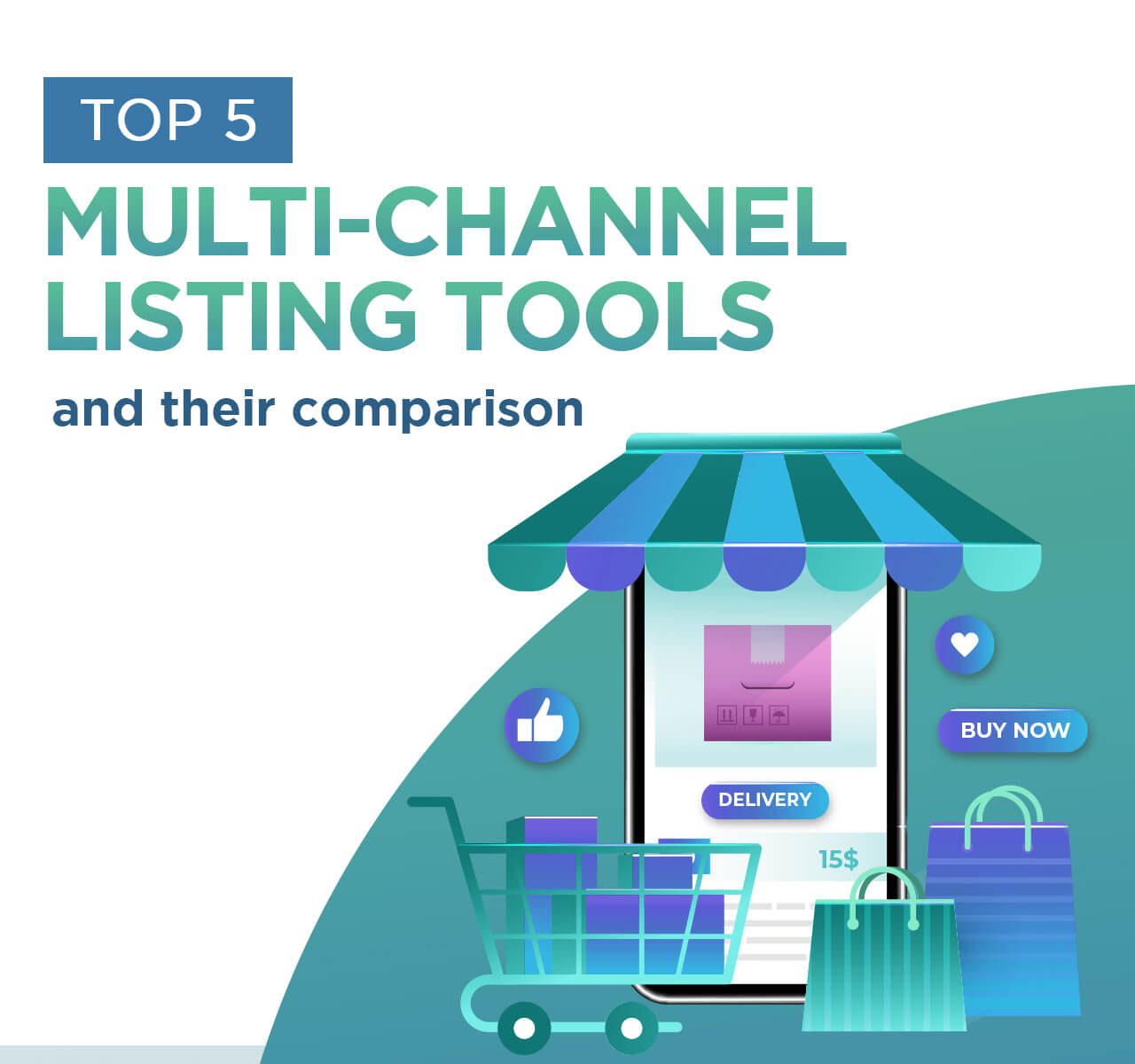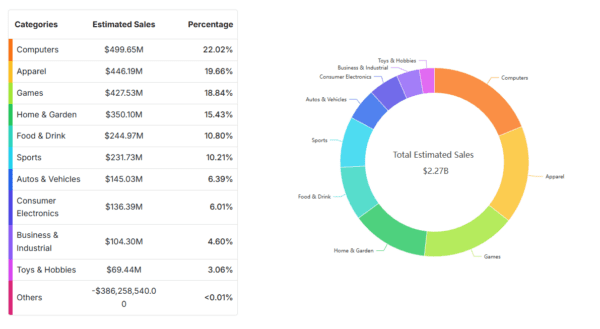
Top 5 Multi-Channel Listing Tools and Their Comparison
If you are an online retailer, you would have probably heard of the multi-channel selling strategy. Multi-channel listing simply means diversifying your business’ selling channels to reach new customers, improve brand awareness, and boost sales. Doing a multi channel listing involves a significant outlay in terms of capital and manpower to ensure that your customers have a consistent and seamless experience across channels. As your brand grows, managing and monitoring sales will be a challenge. This is why multi channel listing tools are vital in ensuring that you have a centralized console to manage your business activities across different selling channels. In this blog, we explore the top five multi-channel listing tools and what they can do for your business.
What is a Multi-Channel Listing Tool?
Multi-channel listing tools are software that will help automate and integrate product listings, manage your inventory across selling channels and help you understand your performance on different channels.
By streamlining your processes, a multi-channel listing tool lets you keep your focus on the business when it manages your multi-channel sales strategy from the back end. This will let you make the most of your sales channels.
An ideal listing tool helps you optimize your multi-channel online retail management. Before going into the best five tools, let us consider what features make a good multi-channel listing tool.
What are the Factors to Consider While Choosing a Multi Channel Listing Tool?
1. SKU Limits
When you’re handling business across multiple channels, you will have a set inventory to spread across each sales funnel. This means you will have to consider the SKU limits in terms of both cost and quantity.
Your preferred multi-channel listing tool should be able to handle the SKU count that your business deals in or will eventually deal in. If you do not take into account the growth of your business, you risk losing valuable customers and resources over an avoidable mistake.
Multi channel listing tools support various channels, but not necessarily the channels your business uses. Or if you intend to expand your business across more channels, will your preferred platform be able to support such a decision?
While there are multi-channel listing tools that seem like a one-stop solution for any and every channel out there, it is equally important to judge the quality provided by the software. Tools that support most channels can often lack quality and depth and will hinder your business in the long run.
3. Price
Depending on your budget, you may need to determine what features of the multi channel listing tool are absolutely required and what are optional. Identifying these can help make sure you don’t spend excessively on tools that won’t benefit your business in contrast with the cost incurred. You should also try to avoid solutions that try to charge you extra for additional channels and tools added even after contracting.
As a business, you would have a set of long-term and short-term goals that need to be achieved in the most efficient manner possible. Your choice of multi-channel listing tool will play a significant role in helping you achieve your business objectives. Whether it is improving listing quality or profit margin, you will need to analyze the tools to ensure they will support your priorities as a business.
Top 5 Multi Channel Listing Tools and Their Comparison
1. SellerChamp
SellerChamp is one of the best multi-channel SKU management software currently on the market. It is a cloud-based solution that provides you with the tools for product repricing, cross-selling, shipping, inventory management, and various other functions.
It can be integrated with ShipStation to create custom labels for your products and specify details such as name, location, and SKU number. SellerChamp also allows you to connect multiple seller accounts to the software, so you can manage your sales on a single platform. It also has advanced search filters for your products and uses AI to manage repricing.
Pros:
- Easy to use software
- Ability to import stock from one sales channel to another
- Software builds listings just by scanning UPC
- Manifest product lookup is an outstanding feature on the software
Cons:
- Woo Commerce listings require improvement
- Manifest search can be slow sometimes
2. Hammoq
Hammoq uses virtual assistants to create listings on marketplaces. The software can be used easily on your browser or mobile app. It’s a clear-cut solution to saving time creating listings manually and allows you to focus on tasks that require more decision-making skills.
Hammoq works well with many marketplaces including eBay, Mercari, Poshmark, depop, Shopify, Amazon, and Facebook.
Pros:
- Virtual assistants handle everything related to creating listings
- Highly responsive support team
- Creates effective ads for your business
Cons:
- Fairly new to the market, so it lacks a lot of features
- Users state the software fails to work sometimes on both browser and mobile
3. Zentail
If your business deals in over $1 million in gross merchandise value (GMV), or you’re close to achieving that milestone, then Zentail might be for you. It is slightly more complex than a starter platform, so you will require some training to get familiar with Zentail. It also uses AI tools to help you manage your business.
Zentail supports integrations with the leading U.S. e-commerce markets such as Amazon, Walmart, eBay, and Google. Currently, it does not support channels leading to international markets. While it is pricier than most basic alternatives, subscribers get full access to the platform regardless of their active plan.
Pros:
- Zentail includes highly useful features like error resolution, bulk edits, business rules, listing splits, and SMART Types
- One of the best customer support teams for a multi-channel listing software
- Exceptional knowledge of Google PPC
- Supports automation of redundant tasks
Cons:
- Lacks the feature to generate purchase orders
- Sales forecasts could be improved
- Considerably more expensive than other alternatives
4. SellerActive
SellerActive is great for SMEs that are looking for standard tools for their multi-channel listing needs. It offers features such as repricing, inventory management, and order management.
The software supports some of the most popular channels like Amazon, Walmart, eBay, and Newegg. SellerActive even allows for the use of Amazon international. If your business uses direct sales channels, then SellerActive also covers Shopify, Shopify Plus, BigCommerce, Magento, and more.
Pros:
- SellerActive offers great value for money for small and medium-sized businesses
- The software is very easy to use
- Support staff offers timely and satisfactory assistance when required
- Affordable pricing plan
Cons:
- SellerActive does not support multiple currencies for Amazon international
- It can be a bit behind on updates for the latest features
- Could use more integration of channels
5. Linnworks
Linnworks is primarily an inventory management software. You can track your sales and products across your omnichannel using the advanced tools provided by the software. Linnworks supports over 70 marketplaces, including Amazon, eBay, and Walmart.
The goal of Linnworks is to reduce manual intervention in inventory management. It helps streamline workflow as well as provide your team with essential data required to make critical decisions. The central dashboard can give you an overview of your inventory performance across all channels in real-time.
Pros:
- Linnworks is a customizable solution to your business needs
- Easy to use across all supported marketplaces
- Exception 24/7 support team
- Offers constant updates to stay ahead of competitors
Cons:
- The software could improve user-friendliness
- Reporting and warehouse management are not as good as alternative options
Conclusion
Multi-channel listing software must form a vital part of your management software, especially when you are considering expanding your businesses to new online retail spaces.
Multi-channel listing tools give eCommerce businesses a holistic view of their operations by helping optimize inventory, manage product listings across marketplaces and help reach new customers. There is no one-size-fits-all solution that is suitable for businesses. Rather, you may need to cherry-pick the ideal multi-channel listing tool based on your business size, channels, functionality, and format.

















